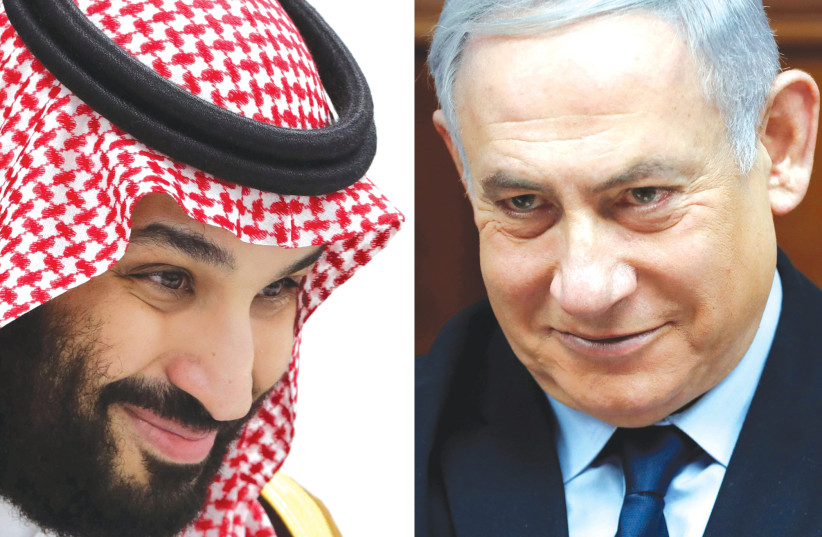Great excitement has spread all over the world following the interview given by Saudi Crown Prince Mohammed bin Salman (MBS), the de facto ruler of the Kingdom of Saudi Arabia (KSA), to Fox News, saying that “every day we get closer” to normalizing relations with Israel. He denied rumors that negotiations were suspended – reports that for a short while replaced news of Israel’s domestic turmoil.
Normalization with KSA is a continuation of the Abraham Accords that undoubtedly had Saudi blessings from the start. Yet, moving the interactions with the KSA from a semi-clandestine undertaking to the open arena is essential for Israel.
The KSA, the guardian of the most important Muslim shrines and a state with abundant wealth, carries great weight in the Arab and Muslim world. A step toward normalization would open many economic and diplomatic opportunities for Israel in important Muslim states such as Bangladesh, Iraq, Kuwait, and Indonesia. It would ameliorate Israel’s position in international fora and further marginalize the Palestinian issue. Yet, the widespread exhilaration in Israel has to be tempered by looking at the potential cost of normalization with the KSA.
The Biden administration wants Israel to support the American transfer of nuclear technology that would allow Riyadh to enrich uranium, which could have it acquire a nuclear military capability. Producing fissionable material by uranium enrichment is potentially dangerous because there is no way to ensure timely warning of the diversion of fissionable material for military use. Even the most stringent inspections cannot provide foolproof detection before it is too late to prevent nuclearization. In essence, there is no difference between a civilian and military nuclear program.
Public pledges to nuclear arms
MBS is on public record pledging to acquire nuclear weapons if he believes Iran is developing them. He rightly fears a nuclear Iran – and unless Israel prevents it, Iran is on the path to becoming a nuclear power. However, satisfying Saudi nuclear aspirations at this time would precipitate a nuclear arms race in the Middle East and beyond. Initially, it would increase the pressure on Iran to go nuclear.

An American-KSA nuclear deal would cause other Middle Eastern powers to hurriedly attempt to acquire nuclear capabilities and, eventually, a nuclear arsenal. Turkey and Egypt immediately come to mind. Preventing nuclear proliferation in the Middle East is an American permanent and paramount interest.
A multi-polar nuclear Middle East is an unstable international constellation. Nuclear deterrence in such a Middle East is difficult to achieve due to the small distances and characteristics of political leadership. It is a strategic nightmare for small Israel. The Begin Doctrine (Israel’s preventive strike, counter-proliferation policy aimed at potential enemies’ capacity for weapons of mass destruction) aims to prevent such a scenario, even if it includes the use of force. That is the rationale against an Iranian nuclear bomb.
We should not forget that the Middle East hosts some of the most fanatical religious groups with few moral constraints. ISIS is a vivid example; Hezbollah is on the terrorist organization’s list of many countries; Saudi Wahabism, eclipsed for the time being by MBS rule, is not a paragon of moderation either. In contrast to other world regions, religious extremists could reach positions of power. The ayatollahs call the shots in Tehran and have significant influence elsewhere. The potential for nuclear weapons falling into such hands is frightening.
American think tanks are urging President Joe Biden not to finalize any civilian nuclear cooperation agreement with the KSA unless it foreswears enriching uranium, reprocessing spent reactor fuel, and operating heavy water reactors or heavy water production plants. They also insist that the KSA agree to the most intrusive International Atomic Energy Agency (IAEA) nuclear inspections under an Additional Protocol. Such conditions were secured by the Bush and Obama administrations when a civilian nuclear program was approved for the KSA’s neighbor, the United Arab Emirates.
It is not clear that MBS has any intention of accepting any constraints. Even if he does, the conditions mentioned above, known as the Nonproliferation Gold Standard, allow for a nuclear infrastructure that could be developed later into a military program.
However, the best way to allay KSA’s legitimate security concerns and to incorporate the kingdom into the Abraham Accords is for the US and Israel to prevent the fruition of the Iranian nuclear program. That, unfortunately, means military action. Hopefully, American and Israeli leaders will realize that their procrastination versus Iran leaves them no choice at this stage but to use force. Acting responsibly in this case means initiating a preventive strike against the Iranian nuclear facilities rather than providing the KSA with nuclear enrichment.
Acting responsibly is also the best response to prevent further Chinese encroachment upon the Middle East. Beijing has signed strategic agreements with Iran, Syria, and even the Palestinian Authority. All these political entities are anti-American. The US must show the world that reliance on China cannot prevent unilateral measures by the US or Israel, its ally. It should be clear that getting closer to China might be costly.
Hopefully, American and Israeli leaders will realize their true responsibility and that they will not sacrifice vital national interests for domestic political dividends.
The writer is president of the Jerusalem Institute for Strategy and Security (JISS).
